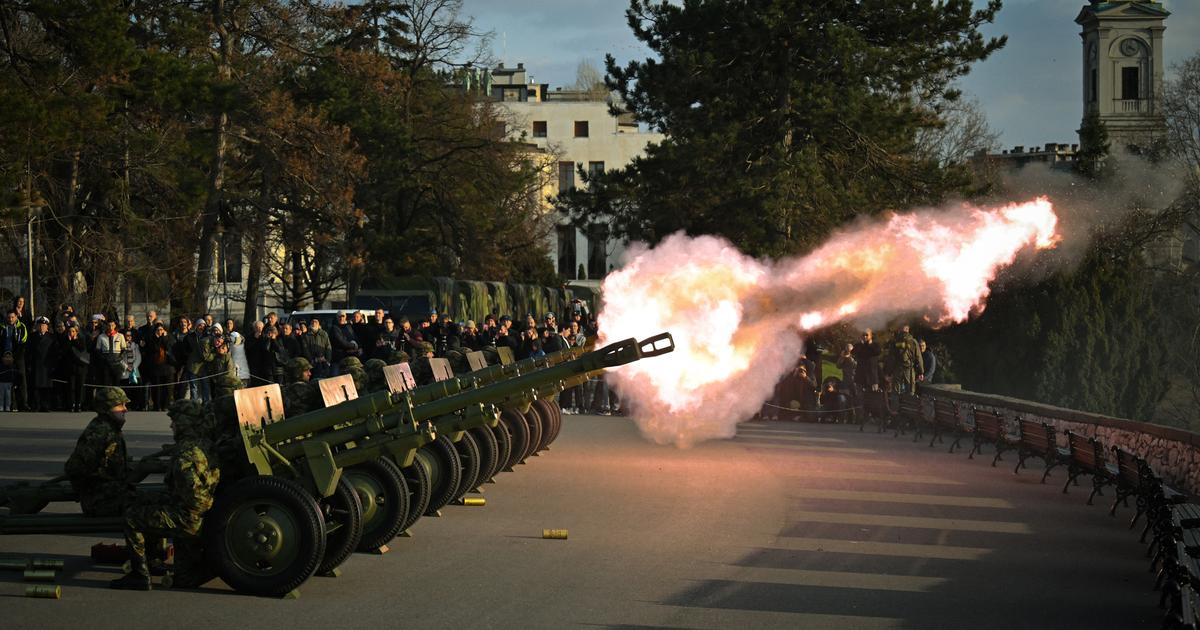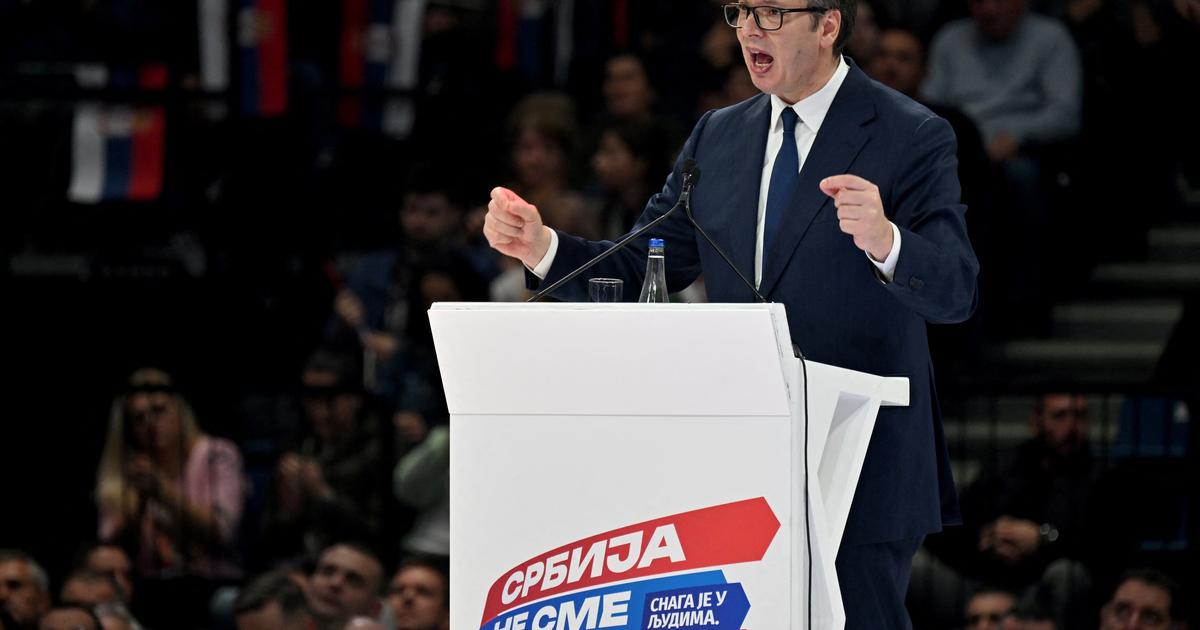Enlarge image
A pro-Russian demonstration in April in Belgrade
Photo: Alexandar Djorovich / SNA / IMAGO
When it comes to the newest signals from Eastern and Southeastern Europe, The Austrian Foreign Ministry has extremely sensitive feelers.
After all, the city of Lviv, called Lemberg at the time, along with Sarajevo and Banja Luka in Bosnia were ruled from Vienna until 1918.
Which is why Austrian diplomats aren't just looking at Ukraine with concern these days, but also at developments in the Balkans.
"We all know that Moscow has the ability to cause problems in other areas of the world as well," says Alexander Schallenberg, Austria's foreign minister.
In the Balkans, he says, Bosnia and Herzegovina is particularly at risk.
Should the conflict expand from Ukraine to the nations of the former Yugoslavia, the impacts on Europe would be devastating, Schallenberg warns.
"If the situation explodes in the Western Balkans, it would essentially mean conflict in the EU's backyard."
He insists that the remaining six non-EU countries in the Balkans must be integrated into the bloc as soon as possible.
"That is self-protection, not altruism."
The signals coming from those regions populated by Serbs - the Orthodox kinsfolk of Russia - are, indeed, unsettling.
Aside from Serbia, that applies to Bosnia, Kosovo, Montenegro and North Macedonia.
Clouds have grown especially dark in the majority Serb entity of Bosnia and Herzegovina, the Republika Srpska.
With the blessing of Moscow, the prime minister of the entity, Milorad Dodik, has in recent months been intensifying his efforts at achieving his long-term goal of secession.
As a member of the tripartite Presidency, he is an official representative of Bosnia and Herzegovina, but still refers to the country as a "stillborn" or a "demonic country."
At a mid-April speech to followers in the city of Bijeljina, he called out: "Hail Serbia! Hail Russia! Hail Republik Srpska!"
He didn't mention the country of Bosnia and Herzegovina even once.
Precisely 30 years after the outbreak of the Bosnian war, in which around 100,000 people lost their lives, signs that yet another armed conflict in the Balkans may be brewing are on the rise.
Some observers are concerned about a belligerent axis stretching from Moscow to Belgrade and towards the Republic of Srpska capital of Banja Luka – and they are worried that Greater Serbia separatists can be certain of Kremlin support.
NATO Secretary General Jens Stoltenberg explicitly mentioned Bosnia in a discussion of potential threats in early April.
And Živko Budimir, who was once the Croatian representative in the Presidency, even believes that the Kremlin would provide diplomatic support should the Republika Srpska declare independence.
Will Vladimir Putin attempt to apply the model established in eastern Ukraine, with the "People's Republics" of Luhansk and Donetsk, in Bosnia and Herzegovina?
Since last fall, the Republika Srpska, under the leadership of Dodik, has blocked most of Bosnia's state institutions.
More than 200 laws and legal acts have been suspended.
The Republika Srpska, which makes up just under half of the country's territory, also wants to build up its own military and to cease recognizing the jurisdiction of the national judiciary and the tax authority.
The plan is essentially that of destroying the fragile entity that was created by the Dayton Accords in 1995: the Federation of Bosnia and Herzegovina, within which Muslim Bosniaks, Serbs and Croatian are to live under a common roof and according to shared rules.
An assassination in Sarajevo in 1914 triggered World War I. Three generations later, Sarajevo was the center of the bloodiest of all the wars that accompanied Yugoslavia's disintegration.
What lessons has the world drawn?
The European military operation EUFOR Althea has almost doubled its presence in the region.
The US and Britain have implemented sanctions against Dodik and other Republika Srpska leaders.
The European Union, meanwhile, has thus far shied away from the following suit: a veto from Viktor Orbán's Hungary is an almost certainty, but so, too, is one from Croatia.
Under the pretext that the Croatian population is facing disadvantages, particularly in Herzegovina, their leader Dragan Čović has repeatedly joined Dodik in attacking the Federation's institutions.
The Croatian Democratic Union (HDZ), which is a member of the center-right European People's Party group in European Parliament, lobbies on Čović's behalf in Brussels.
In April, the German government froze 105 million euros worth of investments in Dodik's empire, a warning shot.
And in early April, Christian Schmidt, the international community's high representative for Bosnia and Herzegovina, used his so-called "Bonn Powers" – the authority granted to the high representative under the Dayton Accords to overrule laws and appointments in the country – for the first time, nullifying one of the Serbians' legal thrusts.
At a recent rally in Banja Luka, which Dodik also attended, demonstrators sang offensive songs which also included death threats against Schmidt.
Dodik is merely a pawn on Vladimir Putin's vast chessboard, but one who is positioned far to the west.
Just 50 kilometers separate his office from the EU border.
The Serbian ultranationalist is playing with fire right under the eyes of the European bloc and prides himself on his close ties with the Kremlin chief, who received Dodik yet again in Moscow in December.
Strategic instructions are regularly communicated to Dodik by Russian Foreign Minister Sergei Lavrov or the Russian ambassador, Igor Kalabuchov.
The ambassador has made clear what Bosnia can expect if it seeks to go beyond NATO's Partnership for Peace program and take steps toward joining the alliance.
"We have shown what we expect on the example of Ukraine," he said this spring.
"If there are threats, we will react."
Sarajevo wasn't the only capital that interpreted his words as a clear threat.
"I told Dodik not to form an army, and he accepted."
With this sentence, Serbian President Aleksander Vučić recently sought to clarify who actually has the final word in the Serbian camp.
Vučić also has close ties to the Kremlin and is regularly received by Putin.
He did, however, support the condemnation of Russia's invasion of Ukraine in the UN Security Council before deciding against acquiescing to EU demands that he join its sanctions regime.
Vučić is considered a master in the art of avoiding clarity.
The efficient autocrat rules of his country, the most populous of those that arose on the territory of Yugoslavia, with a strong hand and a carefully calibrated balancing act.
Serbia is an EU accession candidate, but that hasn't prevented the president from flirting with the Kremlin in the past, lauding the Serbian-Chinese friendship and selling himself in Washington as the only anchor of stability in the Balkans.
Newly reelected for another term in office, the pressure has been rising on Vučić since the beginning of the Russian invasion to take a clear position – pressure from the EU, but also from the US, which in late March sent Christopher Hill to his embassy in Belgrade, a heavyweight with plenty of Balkan experience.
But Vučić has continued to allow himself to be pinned down.
His country recently armed itself with a Chinese air defense system.
"Many," Vučić said recently, putting his practiced vagueness on full display, are interested in destabilizing the Balkans.
He doesn't, of course, count himself among them.
The tabloid newspaper
Informer
, which belongs to a close friend of his, headlined its story on the beginning of the Russian invasion: "Ukraine Has Attacked Russia."
Thousands of people then marched through Belgrade chanting: "Putin, Putin. Serbia and Russia, brothers forever!"
Just last year, two-thirds of all Serbs said they had a "very positive" image of Putin.
Vučić needs Russia as a veto power when it comes to blocking a UN Security Council resolution aimed at a formal recognition of the former Serb province of Kosovo under international law.
And he needs Russia as a strong counterbalance when it again comes time to commemorate the bombing of Serbia in 1999, which was supported by 19 NATO member states.
Just as Russia bolsters its imperial ambitions with the catchphrase "russkiy mir" – the Russian world – the term "srpski svet" – the Serbian world – can increasingly be heard in Serbia, a designation that carefully includes all areas in which Serbs live.
Vučić seems to be eager to partly maintain the Greater Serbia rhetoric established in the 1990s under Slobodan Milošević, though less out of conviction than out of calculation.
According to an April survey, a majority of Serbs are now, for the first time ever, opposed to joining the European Union.
Vučić dreams of "a great, powerful Serbia that others fear and look up to, and which entrusts the only important position in the country to the appropriate person – to himself," says the political scientist Vedran Džihić, who teaches in Vienna.
He adds that Serbia isn't alone in arming itself, Kosovo is doing the same.
In Bosnia, meanwhile, Džihić says there is a danger that "Dodik is beginning to stoke the flames here and there to establish a front beyond the war in Ukraine. I am convinced that there are plenty of Russian intelligence agents active in the Republika Srpska. "
Džihić says that the entire situation in the Balkans is "extremely delicate. At the moment, there is virtually nothing in the region that is at all reassuring."
Much now depends on newly re-elected French President Emmanuel Macron.
Will he be able to push forward the integration of the Western Balkans into the EU during the remaining two months of the French presidency of the Council of the European Union?
Can he jump start accession talks with Albania and North Macedonia?
Can he make progress on the Kosovo question?
The way in which the EU reacts to the tensions in its immediate neighborhood will be paramount.
So for the Kremlin.








